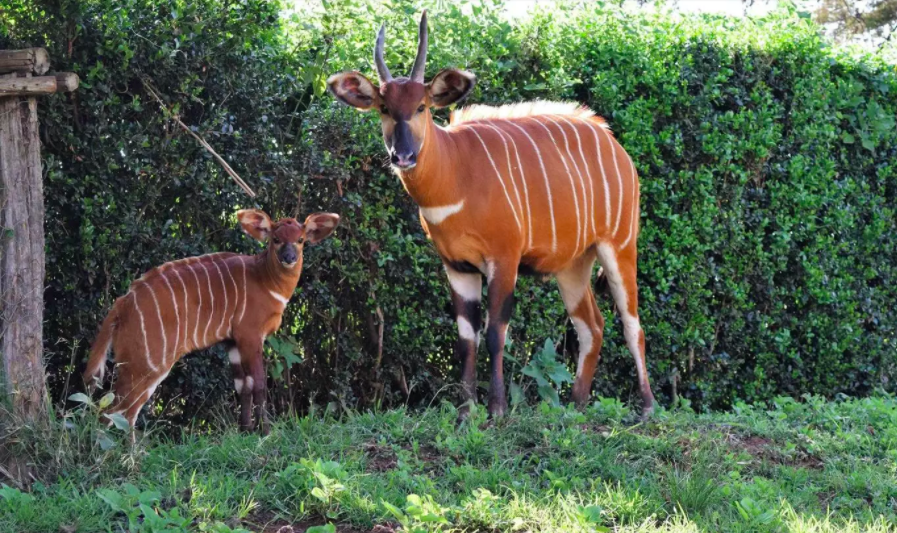Critically-endangered mountain bongo numbers increase
Restocking scheme and community education helps dwindling population climb in Kenya

The sub-species is found in dense mountain forests, and is threatened due to illegal hunting, logging, disease and loss of habitat, rendering them now critically endangered.
Mountain bongos are only found in Kenya, in their natural habitat in the Aberdares Mountains, Mt. Kenya, Mau Forest, Cherengani and Ol Doinyo Eburu forests with only 108 left in the wild presently.
An organisation, Bongo Surveillance Project (BSP), has been instrumental in efforts to bring in bongos from zoos around the world to restock Kenya’s forests. Efforts to save the threatened creature began in 2004.
Mountain bongo populations in the Aberdares had significantly declined over the years drawing the attention of the then senior warden Aberdare national park, John Muhanga. “He was concerned that he could not easily spot them as was the case in the past and thus wanted to verify if there were any bongos still in existence,” says Mike Prettejohn, founder of Bongo Surveillance Project.
Having previously been involved in hunting the bongos for trophies in his early days before the trade was banned in Kenya in 1976, Mike understood the behaviour of the animals. A group of highly trained trackers came on board to monitor the bongos and remove snares in the ecosystem. There were few remnant groups in existence within the park.
“Using camera traps and GPS we were able to monitor bongos to prove that they were surviving,” says Mike. Mountain bongos are elusive animals and until recently little was known about them.
Use of camera traps in identifying and GPS to monitor tracking has proved effective. “By studying the pictures collected, we are able to determine the number of bongos and monitor and protect them,” says Christian Lambrechts, Chief Executive Director at Rhino Ark, a Kenyan conservation organisation.
It supports BSP through funding and protection of bongo natural habitat by fencing forests. The few that remain in the wild in Kenya are under threat due to human activities in the forest.
From the Aberdares, the community-led programme later expanded to areas with remaining suitable habitats in Mau, Ol Doinyo Eburu, Cherengani range and Mt. Kenya forests. Well-trained local guides help in tracking, monitoring sightings and taking note of illegal forest activities. Small breeding populations in some of these areas pose a genetic challenge.
“There are places with less than 15 bongos. Due to their vulnerability they could easily disappear in the next couple of years,” says Christian. To avert possible extinction of the species, bongo survival has been boosted through efforts to breed them in captivity. In 2004, 18 bongo antelopes were repatriated from zoos in the US to Mount Kenya Wildlife Conservancy to rebuild the dwindling populations.
That number has significantly grown to over 70 increasing hope of survival for the bongos. Another aspect of bongo survival is awareness creation among local communities. BSP is working with 19 schools near the mountains ecosystem to educate them about the importance of conserving forests, and protecting wildlife.
“We encourage them to plant trees because well-conserved forests come with numerous other benefits besides protecting these endangered species,” says Mike. The students are helping spread the message to the communities.
Visit www.mountainbongo.org for more information.
This article is reproduced here as part of the Giants Club African Conservation Journalism Fellowships, a programme of the charity Space for Giants and supported by the owner of ESI Media, which includes independent.co.uk. It aims to expand the reach of conservation and environmental journalism in Africa, and bring more African voices into the international conservation debate. Read the original story here

Join our commenting forum
Join thought-provoking conversations, follow other Independent readers and see their replies
Comments
Bookmark popover
Removed from bookmarks